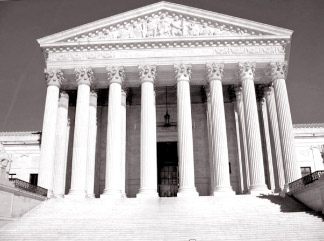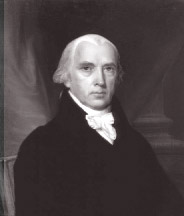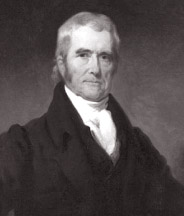JUDICIAL review: Absent in US constitution, should it be in ours?
Some persons have
purported to query the authenticity of Rajpal Abeynayake’s claim in his
column on Friday in these pages, that Judicial Review of Legislation in
the US is not part of the US constitution. Here, a writer extracts
certain authoritative observations on that matter, together with his own
comments. That judicial review is not part of the US Constitution is of
course obvious.
Kamal Wickramasinghe
The United States Constitution does not explicitly establish the
power of judicial review. Rather, the power of judicial review has been
inferred from the structure, provisions, and history of the
Constitution.
|

US Supreme Court |
Prior to 1787, state courts in at least seven of the thirteen states
had engaged in judicial review and had invalidated state statutes
because they violated the state constitution. The most extensive
discussion of judicial review was in Federalist No. 78, written by
Alexander Hamilton, which clearly explained that the federal courts
would have the power of judicial review.
The proposal known as the ‘Virginia Plan’ that included a ‘council of
revision’ that included the president and some federal judges to examine
proposed new federal laws was debated at the Constitutional Convention.
Section 25 of the Judiciary Act of 1789 incorporated the concept of
judicial review by giving the Supreme Court the power to review state
court decisions involving the constitutionality of both federal and
state statutes.
However, the Constitution gave only limited ‘original jurisdiction’
to the Supreme Court.
The Judiciary Act therefore attempted to give the Supreme Court
jurisdiction that was not ‘warranted by the Constitution.’
The Supreme Court’s landmark decision on the issue of judicial review
was Marbury v. Madison (1803), written by Chief Justice John Marshall,
was the first Supreme Court case to strike down an act of Congress as
unconstitutional.
The Marbury case arose when William Marbury filed a lawsuit directly
in the Supreme Court seeking an order (a ‘writ of mandamus’) requiring
the Secretary of State, James Madison, to deliver to Marbury a
commission appointing him as a justice of the peace.
The constitutional issue involved the question of whether the Supreme
Court had jurisdiction to hear cases involving writs of mandamus under
the powers granted by Judiciary Act of 1789.

James Madison |

John Marshall |
Marshall’s opinion stated that in the Constitution, the people
established a government of limited powers: “The powers of the
Legislature are defined and limited; and that those limits may not be
mistaken or forgotten, the Constitution is written.”
The limits established in the Constitution would be meaningless “if
these limits may at any time be passed by those intended to be
restrained.” Marshall observed that the Constitution is “the fundamental
and paramount law of the nation”, and that it cannot be altered by an
ordinary act of the legislature.
Marshall stated that the courts are authorised by the provisions of
the Constitution itself to “look into” the Constitution, that is, to
interpret and apply it, and that they have the duty to refuse to enforce
any laws that are contrary to the Constitution.
Specifically, Article III provides that the federal judicial power
“is extended to all cases arising under the Constitution.” Article VI
requires judges to take an oath “to support this Constitution.”
Article VI also states that only laws “made in pursuance of the
Constitution” are the law of the land. Marshall concluded:
“Thus, the particular phraseology of the Constitution of the United
States confirms and strengthens the principle, supposed to be essential
to all written Constitutions, that a law repugnant to the Constitution
is void, and that courts, as well as other departments, are bound by
that instrument.”
Writers Comment: Marbury has long been regarded as the seminal case
with respect to the doctrine of judicial review.
But Marshal’s interpretation of the law is based on circular argument
and is based, not on written authority, but his own interpretation of
events during the development of the Constitution: he asserted that
judicial review was ‘acknowledged’ by the Constitution’s framers, and
was explained in the Federalist Papers (78) and in the ratification
debates, and was used by both state and federal courts for more than
twenty years before Marbury.
Marshall then applied the circular argument that it would be an
‘absurdity’, to require the courts to apply a law that is void. Rather,
it is the inherent duty of the courts to interpret and apply the
Constitution, and to determine whether there is a conflict between a
statute and the Constitution.
It is clear that Marshall was on the side of the privileged classes
who fought to limit the powers of the legislature which is fundamentally
undemocratic. The US still suffers from this malaise, with racial and
other discriminations with power essentially vested in the rich and
powerful. |







